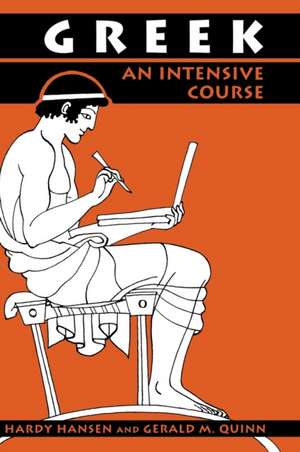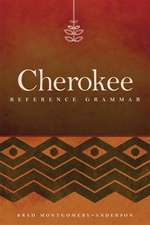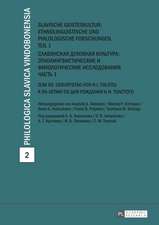Greek – An Intensive Course, 2nd Revised Edition
Autor Hardy Hansen, Gerald M. Quinnen Limba Engleză Hardback – 31 dec 1991
| Toate formatele și edițiile | Preț | Express |
|---|---|---|
| Paperback (1) | 365.76 lei 3-5 săpt. | +60.51 lei 7-13 zile |
| ME – Fordham University Press – 31 dec 1991 | 365.76 lei 3-5 săpt. | +60.51 lei 7-13 zile |
| Hardback (1) | 687.92 lei 6-8 săpt. | |
| ME – Fordham University Press – 31 dec 1991 | 687.92 lei 6-8 săpt. |
Preț: 687.92 lei
Preț vechi: 849.28 lei
-19% Nou
Puncte Express: 1032
Preț estimativ în valută:
131.70€ • 137.41$ • 110.40£
131.70€ • 137.41$ • 110.40£
Carte tipărită la comandă
Livrare economică 12-26 martie
Preluare comenzi: 021 569.72.76
Specificații
ISBN-13: 9780823216642
ISBN-10: 0823216640
Pagini: 868
Dimensiuni: 185 x 263 x 54 mm
Greutate: 1.72 kg
Ediția:2
Editura: ME – Fordham University Press
ISBN-10: 0823216640
Pagini: 868
Dimensiuni: 185 x 263 x 54 mm
Greutate: 1.72 kg
Ediția:2
Editura: ME – Fordham University Press
Notă biografică
Hardy Hansen, Gerald M. Quinn
Cuprins
CONTENTS Greek: An Intensive Course is divided into a Text, with twenty Units, and an Appendix. Each Unit is divided into Sections which are numbered continuously (1-153). At the end of each Unit there are Vocabulary, Vocabulary Notes, Drills, Exercises, and, beginning with Unit 4, Readings of original Greek texts. The Appendix contains additional grammar (Sections 154-168); a summary, for reference, of morphology and syntax; Greek-English and English-Greek vocabularies; and an Index of the Text and Appendix. The Appendix has a separate table of contents. INTRODUCTION 1. The Greek Language; 2. The Greek Alphabet; 3. Rough and Smooth Breathing; 4. Long and Short Vowels; 5. Diphthongs; 6. Iota Subscript and Adscript; 7. Gamma Combined with Certain Consonants; 8. Classification of Consonants; 9. Punctuation and Capitalization; 10. Accent; 11. Recessive Accent; 12. Persistent Accent UNIT 1 13. Nouns: Overview; 14. First-Declension Nouns (Nominative in -17 or -a); 15. Second-Declension Nouns; 16. The Article; 17. Word Order UNIT 2 18. Verbs: Overview; 19. Principal Parts; 20. Present Indicative Active; 21. Imperfect Indicative Active; 22. Future Indicative Active; 23. Aorist Indicative Active; 24. Agreement of Subject and Verb; 25. Questions; 26. Infinitives and Their Use; 27. Synopsis UNIT 3 28. Perfect Indicative Active; 29. Pluperfect Indicative Active; 30. Perfect Infinitive Active; 31. Subjunctive and Optative Moods - Present Subjunctive Active; 32. Aorist Subjunctive Active; 33. Present Optative Active; 34. Aorist Optative Active; 35. Sequence of Moods; 36. Purpose Clauses REVIEW: UNITS 1 TO 3 SELF-COH.RECTING EXAMINATION 1A SELF-COHRECTING EXAMINATION 1B UNIT 4 37. First-Declension Nouns: Concluded; 38. Adjectives of the First and Second Declensions; 39. Agreement of Adjective and Noun; 40. Position of the Adjective; 41. Conditional Sentences; 42. Elision UNIT 5 43. Passive Voice; 44. Genitive of Personal Agent - Dative of Personal Agent with the Perfect and Pluperfect Passive Dative of Means; 45. Substantive Use of the Adjective; 46. Substantive Use of the Article; 47. The Articular Infinitive UNIT 6 48. Third-Declension Nouns: Consonant Stems; 49. The Relative Pronoun; 50. The Independent Subjunctive; 51. Partitive Genitive (Genitive of the Divided Whole); 52. Genitive of Time Within Which; 53. Dative of Time at Which; 54. Accusative of Extent of Time; 55. Expressions of Time Compared; 56. Accusative of Extent of Space UNIT 7 57. Middle Voice; 58. Middle Voice of Verbs Seen Thus Far; 59. Second Aorist Active and Middle; 60. Principal Parts and Tense Stems: Summary; 61. The Independent Optative; 62. The Demonstrative Adjective/Pronoun "that"; 63. Conditional Sentences with Relative Protases; 64. Adverbs REVIEW: UNITS 4 TO 7 191 SELF-CORRECTING EXAMINATION 2A 193 SELF-CORRECTING EXAMINATION 2B 198 UNIT 8 65. Participles; 66. Formation and Declension of the Active Participles; 67. Formation and Declension of the Middle and Passive Participles; 68. Summary of the Forms of the Participle; 69. Attributive Use of the Participle; 70. Circumstantial Use of the Participle; 71. The Adjective "all, every; whole" UNIT 9 72. Contracted Verbs: Introduction; 73. Contracted Verbs with Present Tense Stems; 74. Contracted Verbs with Present Tense Stems; 75. The Demonstrative Adjective/Pronoun, "this"; 76. The Demonstrative Adjective/Pronoun "this, that"; 77. Demonstratives Compared; 78. Subjective Genitive; 79. Objective Genitive; 80. Dative of Manner; 81. Dative of Respect UNIT 10 82. More Third-Declension Nouns; 83. Third-Declension Adjectives; 84. Contracted Verbs with Present Tense Stems; 85. Verbs with Contracted Futures; 86. Accusative Subject of the Infinitive; 87. Result Clauses; 88. Compound Verbs REVIEW : UNITS 8 TO 10 SELF-COH.RECTING EXAMINATION 3A SELF-CORRECTING EXAMINATION 3B UNIT 11 89. The Imperative Mood; 90. Commands and Prohibitions; 91. Forms of the Greek Verb; 92. The Greek Verb: A Summary; 93. Deponent Verbs : Middle Deponents; 94. Passive Deponents; 95. Partial Deponents; 96. The Adjective/Pronoun; 97. Temporal Clauses; 98. Genitive Absolute UNIT 12 99. -tJL Verbs; 100. Present System of -tJL Verbs; 101. Fear Clauses UNIT 13 102. -tJL (Athematic) Verbs: Continued; 103. Object Ciauses of Effort; 104. Object Clauses of Effort and Purpose Clauses Compared; 105. Accusative of Respect; 106. Accusative of Respect and Dative of Respect Compared UNIT 14 107. Present Participle Active and Second Aorist Participle Active of the Athematic Verbs; 108. Present Participle Middle/Passive and Second Aorist Participle Middle of Athematic Verbs; 109. Perfect Participle Active; 110. The Verb "show"; 111. Supplementary Use of the Participle REVIEW: UN ITS 11 TO 14 419 SELF-CORRECTING EXAMINATION 4A SELF-CORRECTING EXAMINATION 4B UNIT 15 112. The Interrogative Pronoun/Adjective; 113. The Indefinite Pronoun/Adjective; 114. Enclitics Summarized; 115. The Verb "be"; 116. Dative of the Possessor; 117. Adverbial Accusative; 118. Personal Pronouns; 119. Reflexive Pronouns; 120. Possession with Personal and Reflexive Pronouns UNIT 16 121. The Verb "say, affirm, assert"; 122. "perceive, recognize, know"; 123. Future Optative; 124. Future Infinitive; 125. Indirect Statement; 126. Retained Subjunctive; 127. The Adjective "much, many"; 128. The Noun "ship" UNIT 17 129. The Adjective "big, great"; 130. Adjectives of the Type "pleasant"; 131. Comparison of Adjectives; 132. The Verb "go, come"; 133. Numerals; 134. Negative Pronouns/Adjectives; 135. Unattainable Wish REVIEW: UNITS 15 TO 17 UNIT 18 136. The Verb "release, hurl, send"; 137. Indefinite Relative Pronoun - Indirect Interrogative Pronoun/Adjective; 138. Indefinite Relatives and Direct and Indirect Interrogatives; 139. Indefinite, Relative and Interrogative Adverbs; 140. Indirect Question UNIT 19 141. Comparison of Adverbs; 142. Irregular Comparison of Adjectives; 143. The Verb, "know"; 144. Temporal Clauses Introduced; 145. Temporal Clauses Introduced by "before, until"; 146. Attraction of the Relative Pronoun to the Case of its Antecedent Omission of the Antecedent of the Relative Pronoun UNIT 20 147. Verbal Adjectives; 148. The Impersonal Verbs "there is need, must" and "ought, must"; 149. The Impersonal Use in the sense "seem best"; 150. Accusative Absolute; 151. The Verb "lie, be placed, be set "; 152. Second-Declension Nouns of the Type "mind"; 153. The Third-Declension Noun "town" GENERAL REVIEW SAMPLE GRAMMAR EXAMINATION APPENDIX
Recenzii
"Greek: An intensive course is the most massive text currently available for the teaching of elementary ancient Greek. The pedagogical approach is as traditional as ever, but it is intensive; it contains the kind of detail that every teacher dreams about ... it will continue to remain a major tool for the teaching of ancient Greek fully and accurately." Modern Language Journal "This is a text of such wonderful clarity that it is a delight for both student and instructor. It treats the student as if he were readily capable of understanding a language more complex than English and by presenting the substance in logical units rather than dribs and drabs, it encourages even the less talented to make genuine progress. What the gifted can achieve is amazing. " Lydia Lenaghan, Columbia University "Unlike other traditional books, it does not presume a previous knowledge of another inflected language; all the explanations necessary to understand Greek are contained within the book itself." Languages and Literature "...all the new material is very fully and clearly explained...so much so that I had hopes that a motivated student would be able to continue on his own...there are a very large number of drills and practice sentences..." -Peter L.D. Reid, New England Classical Newsletter
"Unlike other traditional books, it does not presume a previous knowledge of another inflected language; all the explanations necessary to understand Greek are contained within the book itself." Languages and Literature "...all the new material is very fully and clearly explained...so much so that I had hopes that a motivated student would be able to continue on his own...there are a very large number of drills and practice sentences..." -Peter L.D. Reid, New England Classical Newsletter "This is a text of such wonderful clarity that it is a delight for both student and instructor." Lydia Lenaghan, Columbia University
"Unlike other traditional books, it does not presume a previous knowledge of another inflected language; all the explanations necessary to understand Greek are contained within the book itself." Languages and Literature "...all the new material is very fully and clearly explained...so much so that I had hopes that a motivated student would be able to continue on his own...there are a very large number of drills and practice sentences..." -Peter L.D. Reid, New England Classical Newsletter "This is a text of such wonderful clarity that it is a delight for both student and instructor." Lydia Lenaghan, Columbia University












